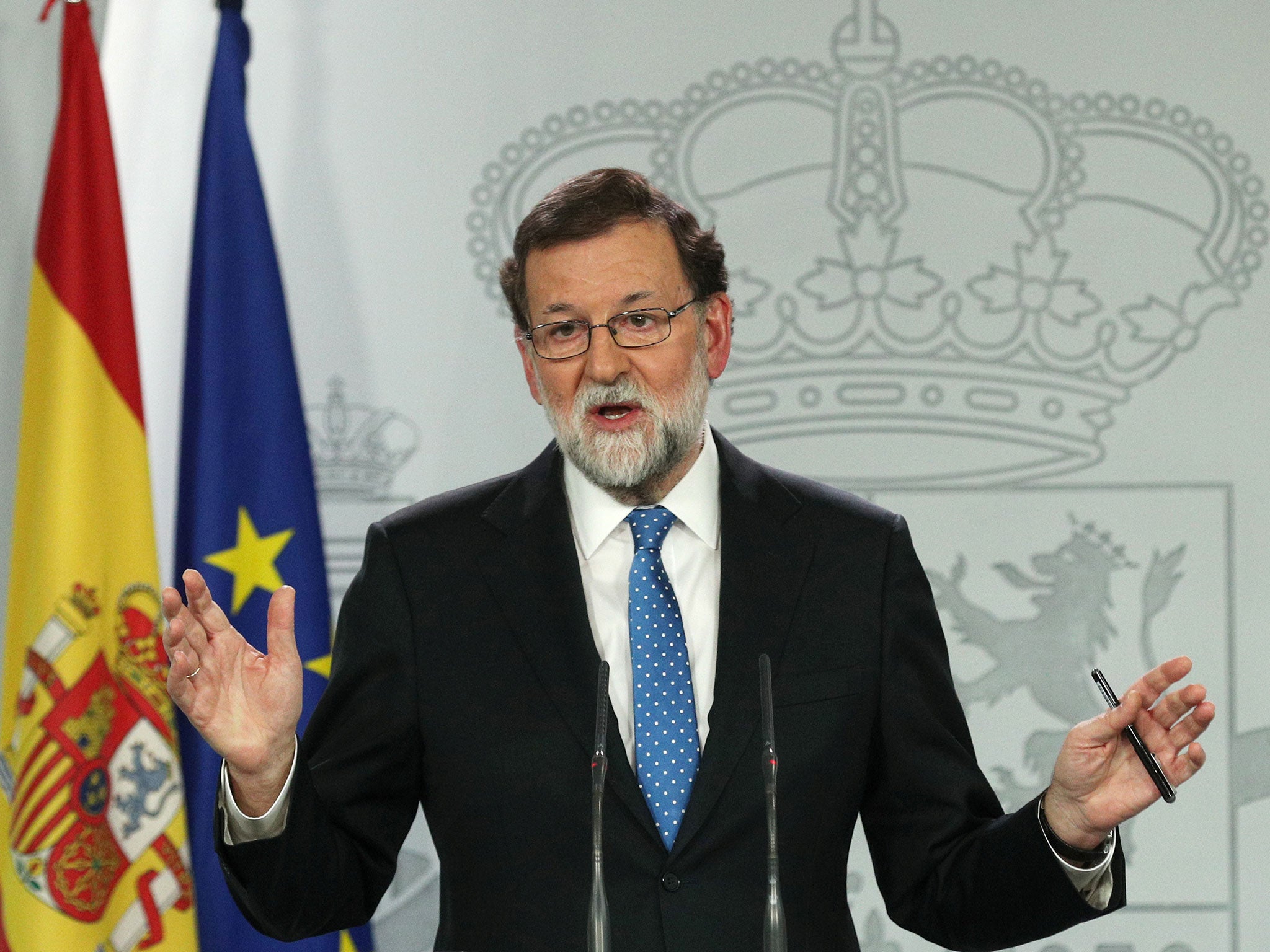Catalonia election: Mariano Rajoy rejects call for talks outside Spain from Carles Puigdemont
Spain’s Prime Minister says there needs to be dialogue – but knocks back suggestion from deposed Catalan leader

Hopes of early negotiations between the exiled president of Catalonia and Madrid following the landmark election in the region have faded, after Spain’s Prime Minister Mariano Rajoy rejected an offer of immediate talks outside the country.
Carles Puigdemont, who fled to Belgium in October, asked for the meeting “without preconditions” after parties seeking independence won an overall majority in the Catalan parliament.
“I am willing to meet Mr Rajoy in Brussels or any other location in the EU, as long as it is not in the Spanish state, for obvious reasons,” he said.
“We need to talk and we have the obligation to do so. It is impossible to find solutions without dialogue.”
Speaking in Madrid, Mr Rajoy acknowledged that a “new era based on dialogue” was needed, saying: “It is evident that something is broken, and it will take time to repair it.”
But asked about Mr Puigdemont’s request, he responded: “The person I need to meet is Mrs Arrimadas, who is the one who has won the election.”
Innes Arrimadas’s unionist Ciudadnos (Cs) – or Citizens – party has emerged as the biggest single party from the polls, but in reality will only be able to form a minority administration.
The Prime Minister later added that he “make an effort to have dialogue with the government that forms in Catalonia”, but it must “stop acting unilaterally and outside the law”.
Madrid had declared that a referendum on independence called by Mr Puigdemont on 1 October was illegal, and he faces an arrest warrant back home.
Oriol Junqueras, the leader of another separatist party Esquerra Republicana (ERC), is in a Spanish prison, along with a number of other Catalan politicians.
Asked whether Mr Puigdemont’s arrest warrant may be rescinded to begin the dialogue he had mentioned, and other Catalan leaders freed from jail, the Prime Minister was adamant.
“These are judicial matters unaffected by the election and politicians need to stay within the law,” he said, adding that “any government which is formed must be subject to the rule of law”.
Catalonia election: in pictures
Show all 9In a move which is likely to lead to more anger among the separatists, prosecutors in Madrid announced that six more Catalan politicians will be investigated for alleged treason and rebellion.
Judge Pablo Llarena of the Supreme Court said that they include former Catalan President Artur Mas, and Marta Rovira, the general secretary of the ERC who was re-elected to parliament in the election and is viewed as a future leader of Catalonia.
Ms Rovira has insisted that she and her colleagues would not be cowed by threats of legal action, and that ERC would support the reinstatement of Mr Puigdemont, whose party, JxCat – Together for Catalonia – got the biggest number of seats among the pro-independence parties.
“We are not contemplating any alternatives; we need to be loyal to what the people had decided at the polls and focus on achieving this,” she said.
About Mr Rajoy, she added: “If he was a democrat, he must accept the result of the election, guarantee the return of Mr Puigdemont and other members of government in exile and do everything possible to free political prisoners.
“He also has to accept that people have totally rejected his own party.”
Mr Rajoy’s Peoples Party (PP) won just four seats, with the bulk of the unionist votes switching to Ciudadnos. Its leader, Ines Arrimadas, maintained that the ERC and JxCat may not be able to form a governing coalition, saying: “Let’s not draw hasty conclusions, they were celebrating, they were euphoric on election night.”
But, she continued, “I know them, and I doubt if they will be able to reach an agreement. This election has shown that there is not a problem between Catalonia and Spain, but between Catalans.
“We must stand together with Spain and we must stand together with Europe.”
The European Union has backed Madrid against the separatists, and some Spanish officials view Mr Puigdemont’s offer to hold talks with the Prime Minister in “any location in the EU” as an attempt to drag Brussels into the dispute.
The EU’s refusal to change its stance has led a frustrated Mr Puigdemont to accuse it of being a “club of decadent countries” which is abrogating its responsibility to mediate a solution.
But in the aftermath of the polls, he said: “I do not ask the European Commission to change its position, only to listen to the whole world, to listen to us as it listens to the Spanish government.
“We have an independentist majority: the more than two million voters are not a hologram – they are real, they matter.”
The view has the support of many by pro-independence voters in the streets.
“The EU complained that not everyone voted in the referendum [on 1 October] but now everyone has had a chance to vote, we have had a record turnout, so it is only fair that they listen to us,” said Raquel Santiago, who works for the Fire Service. “We can’t really understand why there can’t be a dialogue.”
Teacher Vincente Perella said: “This is not like Brexit. We are not anti-Europe; it is Europe which is being anti-us at the moment.
“But we hope that in time there will be another referendum here which will bring us independence, and we will be able to join the EU. Who knows, maybe Scotland will join us there.”
Subscribe to Independent Premium to bookmark this article
Want to bookmark your favourite articles and stories to read or reference later? Start your Independent Premium subscription today.

Join our commenting forum
Join thought-provoking conversations, follow other Independent readers and see their replies